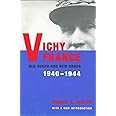Buy new:
-45% $20.88$20.88
$3.99 delivery January 21 - 27
Ships from: Warriors SG Sold by: Warriors SG
Save with Used - Good
$9.38$9.38
Ships from: Amazon Sold by: BILL'S BUYS

Download the free Kindle app and start reading Kindle books instantly on your smartphone, tablet, or computer - no Kindle device required.
Read instantly on your browser with Kindle for Web.
Using your mobile phone camera - scan the code below and download the Kindle app.

Follow the authors
OK
The Vichy Syndrome: History and Memory in France since 1944 Paperback – March 15, 1994
Purchase options and add-ons
- Print length398 pages
- LanguageEnglish
- PublisherHarvard University Press
- Publication dateMarch 15, 1994
- Dimensions6.14 x 1 x 9.25 inches
- ISBN-10067493539X
- ISBN-13978-0674935396
Discover the latest buzz-worthy books, from mysteries and romance to humor and nonfiction. Explore more
Frequently bought together

Customers who viewed this item also viewed
Editorial Reviews
Review
“Succeeds as a practical demonstration, for a particularly vivid case, of how to study a people grappling with a past. It is remarkable how few similar works there are… One understands a historian’s hesitation before the poorly documented and ill-defined wider popular memory as a subject. Rousso shows us, however, how dramatic and revealing this genre can be.”―Robert O. Paxton, New York Review of Books
“This is an original and thought-provoking work, a ‘must’ for anyone interested in the political and cultural psychology of post-war France.”―Nelly Wilson, Jewish Quarterly
About the Author
Stanley Hoffmann (1928–2015) was Paul and Catherine Buttenwieser University Professor at Harvard University.
Product details
- Publisher : Harvard University Press; 49672nd edition (March 15, 1994)
- Language : English
- Paperback : 398 pages
- ISBN-10 : 067493539X
- ISBN-13 : 978-0674935396
- Item Weight : 1.15 pounds
- Dimensions : 6.14 x 1 x 9.25 inches
- Best Sellers Rank: #514,271 in Books (See Top 100 in Books)
- #790 in French History (Books)
- #11,851 in Military History (Books)
- Customer Reviews:
About the authors

Discover more of the author’s books, see similar authors, read book recommendations and more.

Discover more of the author’s books, see similar authors, read book recommendations and more.
Customer reviews
- 5 star4 star3 star2 star1 star5 star86%14%0%0%0%86%
- 5 star4 star3 star2 star1 star4 star86%14%0%0%0%14%
- 5 star4 star3 star2 star1 star3 star86%14%0%0%0%0%
- 5 star4 star3 star2 star1 star2 star86%14%0%0%0%0%
- 5 star4 star3 star2 star1 star1 star86%14%0%0%0%0%
Customer Reviews, including Product Star Ratings help customers to learn more about the product and decide whether it is the right product for them.
To calculate the overall star rating and percentage breakdown by star, we don’t use a simple average. Instead, our system considers things like how recent a review is and if the reviewer bought the item on Amazon. It also analyzed reviews to verify trustworthiness.
Learn more how customers reviews work on AmazonTop reviews from the United States
There was a problem filtering reviews right now. Please try again later.
- Reviewed in the United States on August 20, 2015I came to Henry Rousso's "The Vichy Syndrome: History and Memory in France since 1944" in a decidedly round-about manner. Long a fan of Georges Simenon's Maigret police procedurals, many of them penned during World War II, and more recently a devotee of Patrick Modiano's novels, which are obsessed with the war years, I wondered how the French have interpreted "les annees noires" of German occupation and Vichy collaboration. In my search for answers, Rousso's study (originally published in France in 1990) has proved especially helpful.
"The Vichy Syndrome" is not a social history that either takes us into the homes and workplaces of families as they navigated the turbulent waters of the 1940s or gives us a sense of how the war and its aftermath affected varying strata of society. Instead, it is an intellectual history focused on those political institutions, media outlets, and individuals that shaped memories of the war years as well as an assessment of the French audience toward which this crafting of memory was directed.
Rousso's study provides a bounty of concrete information and inspires us to think more critically about the nature of memory, but it is not an easy read. This reflects the painful terrain covered and the inherently abstract nature of intellectual analysis. Then too there is the extraordinary complexity of wartime and postwar French political life with which the book's original French reading audience would have been more familiar than I. Most of all, however, there is the breathtaking scope of the subject matter covered. This means that Rousso has moved rapidly from one sub-topic to another, and many readers will likely want to team the book with others among the excellent assessments published regarding the Vichy period.
- Reviewed in the United States on September 17, 2016great condition!
- Reviewed in the United States on July 3, 2014Delivery on time and the book is perfect.
Top reviews from other countries
 Mr M BurnittReviewed in the United Kingdom on January 27, 2013
Mr M BurnittReviewed in the United Kingdom on January 27, 20135.0 out of 5 stars Great information
An excellent and informative read with great references that can be used throughout any additional research. If not a good read.











